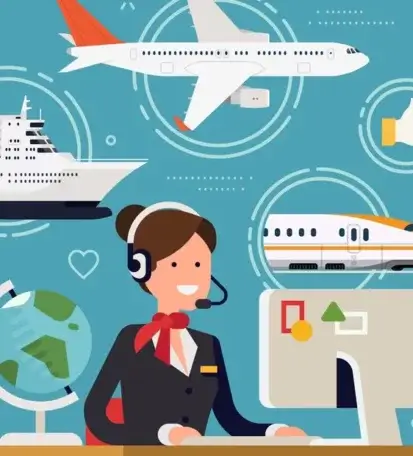Business Travel Guide
10 Ways to Optimise Your Corporate Travel Budget

Corporate travel can be a significant expense for businesses of all sizes. With the cost of flights, hotels, and transportation, it’s easy to see how travel can quickly add up.
However, with the right strategies in place, businesses can optimise their corporate travel budget and save money without sacrificing the quality of their travel experience.
One way to optimise a corporate travel budget is by assessing current travel expenditures. By understanding how much is being spent on travel and where the money is going, businesses can identify areas where they can cut costs.
Another way to optimise a corporate travel budget is by leveraging corporate travel management companies. By leveraging travel management software, businesses can ensure that employees are booking travel in a cost-effective manner. Also, it helps you consolidate travel booking from flights and hotels, to car hire for your transportation.
Key Takeaways
- Assess current travel expenditure to identify areas where costs can be cut.
- Leverage corporate travel policies to ensure that employees are booking travel in a cost-effective manner.
- Negotiate with vendors to secure discounted rates and exclusive deals.
1. Assess current travel expenditure
To begin optimising a corporate travel budget, it is important to first assess the current travel expenditure. This can be done by conducting an audit of travel spending and identifying key cost drivers.
- Audit Travel Spend
Conducting an audit of travel spend involves reviewing all travel-related expenses such as airfare, accommodation, ground transportation, meals, and incidentals. This can be done by examining receipts, invoices, and credit card statements. By doing so, companies can identify areas where they may be overspending and make adjustments accordingly.
- Identify Key Cost Drivers
Identifying key cost drivers involves determining which expenses are contributing the most to the overall travel budget. For example, if airfare is the largest expense, companies may consider negotiating discounts with airlines or using a travel management company to secure better rates. Similarly, if ground transportation is a major cost driver, companies may consider using public transportation or ride-sharing services instead of taxis or rental cars.
By conducting an audit of travel spend and identifying key cost drivers, companies can gain a better understanding of their travel expenses and make informed decisions when it comes to optimising their corporate travel budget.
2. Leverage corporate travel policies
When it comes to optimising corporate travel budgets, implementing clear guidelines and enforcing compliance through a corporate travel policy is crucial. This section will explore the benefits of creating and enforcing a corporate travel policy.
- Implementing Clear Guidelines
A corporate travel policy provides clear guidelines for employees to follow when booking travel. It can include information on preferred airlines, hotels, and car rental companies, as well as guidelines for booking travel in advance and using travel rewards programs.
By providing clear guidelines, employees can make informed decisions when booking travel, which can lead to cost savings for the company. A well-written travel policy can also help employees avoid common mistakes, such as booking last-minute travel or choosing more expensive options.
This can help prevent unnecessary expenses and ensure that employees are making the most of the company’s travel budget.
- Enforcing Compliance
Enforcing compliance with the corporate travel policy is just as important as implementing clear guidelines. By ensuring that employees follow the policy, companies can prevent unnecessary expenses and ensure that the travel budget is used effectively.
One way to enforce compliance is to require employees to submit their travel plans for approval before booking. This can help ensure that employees are booking within the guidelines set out in the travel policy and can prevent costly mistakes.
Another way to enforce compliance is to track travel expenses and conduct regular audits. This can help identify areas where employees are not following the travel policy and can help prevent future mistakes..
3. Negotiate with Vendors
When it comes to optimising corporate travel budgets, negotiating with vendors is a crucial aspect. By securing preferential rates and establishing long-term partnerships, businesses can effectively manage their travel expenses.
- Securing Preferential Rates
Negotiating preferential rates with airlines, hotels, and car rental companies can lead to significant cost savings.
By leveraging the company’s travel volume and commitment, businesses can showcase their value to vendors and negotiate discounted rates for their employees’ travel arrangements.
- Establishing Long-Term Partnerships
Establishing long-term partnerships with select vendors can offer stability and cost benefits. By consolidating travel arrangements with fewer vendors, businesses can simplify the management process and increase their negotiating power.
This approach can lead to streamlined processes and better rates, ultimately contributing to a more efficient corporate travel budget.
4. Adopt advanced booking strategies
One of the most effective ways to optimise a corporate travel budget is to adopt advanced booking strategies. This involves encouraging early reservations and utilising fare predictive analytics.
- Encouraging Early Reservations
Encouraging employees to book their travel plans well in advance can lead to significant cost savings.
his is because airlines and hotels often offer lower prices for early bookings. Companies can incentivise early bookings by offering rewards or discounts to employees who book their travel plans well in advance.
Additionally, companies can create a travel policy that requires employees to book their travel plans a certain number of days in advance, which can help reduce last-minute bookings and their associated costs.
- Utilising Fare Predictive Analytics
Fare predictive analytics is a tool that can help companies predict future airfare prices and identify the best time to book flights.
By using this tool, companies can save money by booking flights at the right time, when prices are expected to be at their lowest. Companies can also use fare predictive analytics to identify the best days to travel, which can help reduce costs even further.
Overall, adopting advanced booking strategies can help companies optimise their corporate travel budget and save money.
5. Embrace travel management
When it comes to optimising a corporate travel budget, embracing technology solutions is a must. By integrating travel management systems and using mobile booking applications, companies can streamline their travel processes and save both time and money.
- Integrating Travel Management Systems
Integrating travel management systems can help companies manage their travel expenses efficiently.
With these systems, businesses can track their spending, monitor their travel policies, and identify areas where they can cut costs.
By having access to real-time data, companies can make informed decisions about their travel budgets and ensure that they are getting the best value for their money.
- Using Mobile Booking Applications
Mobile booking applications have revolutionised the way people book travel. By using these apps, travellers can book flights, hotels, and rental cars on the go, making the process quick and convenient.
For businesses, this means that employees can book their own travel arrangements, freeing up the travel department to focus on other tasks.
Mobile booking applications also offer a range of features that can help businesses save money.
For example, some apps offer last-minute deals on flights and hotels, which can be a great way to save money on business travel. Additionally, some apps allow companies to set travel policies, ensuring that employees book within budget and adhere to company guidelines.
6. Explore Alternative Travel Options
Travelling for business purposes can be expensive, especially if you are sticking to traditional travel options such as flights and hotels. However, there are alternative travel options that can help you save money without compromising on comfort or convenience. Here are two ways to explore alternative travel options:
- Considering Low-Cost Carriers
Low-cost carriers are airlines that offer flights at a much lower price than traditional airlines. While low-cost carriers may not offer the same level of luxury and comfort as traditional airlines, they can help businesses save a significant amount of money on travel expenses.
Some popular low-cost carriers in the UK include Ryanair, EasyJet, and Jet2. When considering low-cost carriers, it is important to keep in mind that they often have strict baggage policies and limited in-flight amenities. However, if you are travelling for a short period and do not require additional amenities, low-cost carriers can be a great option to consider.
- Using Rail Over Air Travel
Another alternative travel option to consider is rail travel. Rail travel can often be cheaper than air travel and can also offer a more comfortable and convenient experience. In addition to saving money on travel expenses, rail travel can also help businesses reduce their carbon footprint.
When considering rail travel, it is important to keep in mind that it may take longer to reach your destination compared to air travel.
However, rail travel can offer a more scenic and relaxing journey, which can be beneficial for travellers who want to avoid the stress of air travel.
7. Focuse on Employee Travel Well-being
When it comes to corporate travel, it’s important to prioritise the well-being of employees. After all, they are the backbone of any company, and their health and comfort should be a top priority.
Here are a few ways to focus on employee travel well-being:
- Balancing Cost and Comfort
While it’s important to keep costs down, it’s equally important to ensure that employees are comfortable during their travels. This means finding a balance between cost and comfort.
For example, instead of booking the cheapest hotel room available, consider booking a room that is comfortable and safe. This will not only help employees feel more relaxed during their travels, but it will also help them be more productive when they arrive at their destination.
- Providing Travel Support and Safety
Another way to focus on employee travel well-being is by providing travel support and safety measures. This can include providing employees with a travel itinerary, ensuring that they have all the necessary travel documents, and offering 24/7 support in case of an emergency.
Additionally, companies can provide employees with safety training, such as how to avoid pickpockets or how to stay safe in a foreign country.
8. Analyse Travel Data for Insights
One of the most effective ways to optimise a corporate travel budget is to analyse travel data to gain insights into spending patterns and identify opportunities for cost savings.
- Tracking Spending Patterns
Analysing travel data can help businesses identify areas where they are overspending and make necessary adjustments to their travel policy. This information can be used to negotiate better rates with preferred vendors and to make more informed decisions about travel arrangements.
To track spending patterns, companies can use a variety of tools, including travel management software and expense management systems.
These tools can help companies collect and analyse data on travel expenses, such as airfare, hotel stays, meals, and transportation. By consolidating this data into a single system, companies can easily track spending patterns and identify areas where they can reduce costs.
- Optimising Future Travel Plans
Once spending patterns have been identified, companies can use this information to optimise future travel plans.
For example, if a company is spending a significant amount on airfare to a particular destination, it may choose to explore alternative travel options, such as train or car travel.
Alternatively, they may choose to negotiate better rates with airlines or hotels to reduce costs.
9. Educate and engage employees
One of the most effective ways to optimise your corporate travel budget is by educating and engaging your employees. This can help to ensure that everyone is on the same page when it comes to cost-saving practices and can lead to more economical travel choices.
- Training on Cost-Saving Practices
One way to educate your employees is by providing training on cost-saving practices. This can include everything from booking travel in advance to using public transportation instead of taxis.
To make this training more engaging, consider using interactive tools such as quizzes or games. This can help to keep employees interested and motivated to learn.
- Incentivising Economical Travel Choices
Another way to encourage employees to make more economical travel choices is by incentivising them.
This can include offering rewards for booking travel in advance, using public transportation, or staying in budget-friendly accommodations.
Rewards can range from small incentives such as gift cards or extra time off to larger rewards such as bonuses or promotions. By incentivising employees, you can create a culture of cost-consciousness and encourage everyone to work together to keep travel expenses under control.
FAQs
What are effective strategies for reducing corporate travel expenses?
Companies can reduce corporate travel expenses by implementing cost-saving measures such as booking in advance, using low-cost carriers, and negotiating with travel suppliers for discounts.
In what ways can companies save on corporate travel costs without compromising on quality?
Companies can save on corporate travel costs without compromising on quality by negotiating with travel suppliers for discounts, using loyalty programs, and selecting hotels and accommodations based on their proximity to meeting locations.
What are the emerging trends in business travel for the year 2024?
Emerging trends in business travel for the year 2024 include the use of artificial intelligence and machine learning to improve travel booking and management processes, the growth of sustainable travel practices, and the increasing use of mobile technology for travel management.
How should businesses prepare for future travel trends and forecasts?
Businesses should prepare for future travel trends and forecasts by investing in technology such as expense management systems and travel booking platforms. Companies should also stay up-to-date on emerging trends in business travel and adjust their policies and strategies accordingly.




